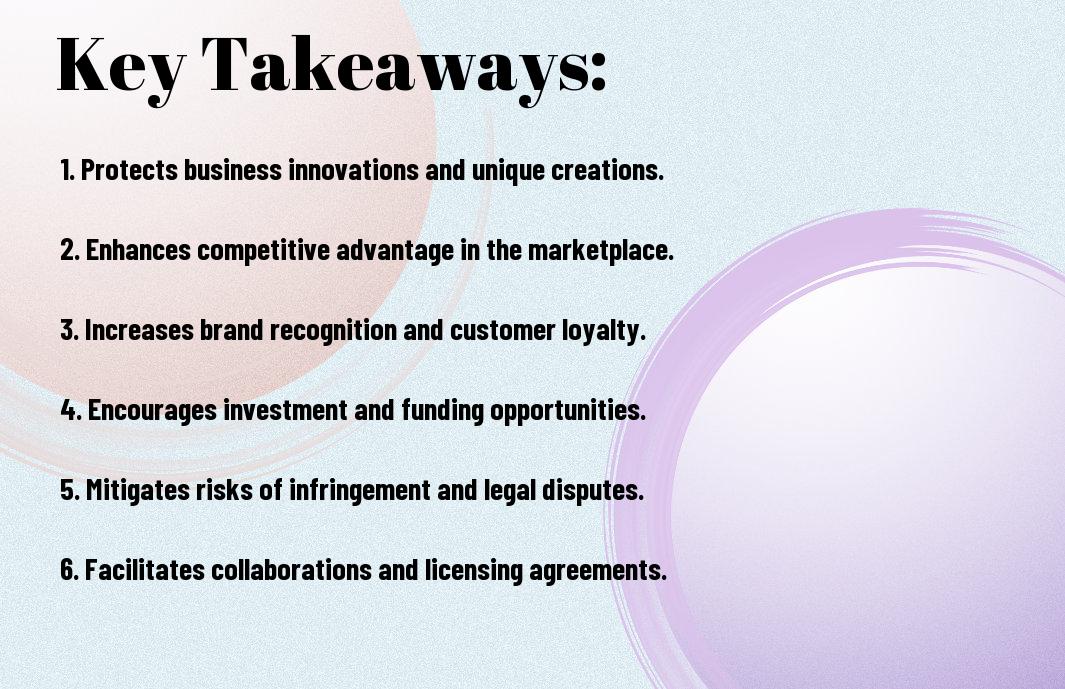Just like any other business asset, intellectual property (IP) plays a vital role in your company’s success. Understanding the significance of IP helps you protect your innovations, brand identity, and competitive edge in the market. By securing your creative ideas and inventions, you can not only safeguard your business but also enhance its value and profitability. Navigating the complexities of IP can empower you to make informed decisions that benefit your enterprise in the long run.
Key Takeaways:
- Protection of Innovations: Intellectual property safeguards unique ideas and inventions, preventing unauthorized use by competitors.
- Enhancing Market Value: IP can significantly increase a company’s valuation, attracting investors and boosting overall market positioning.
- Encouraging Creativity: Strong IP laws incentivize businesses to innovate, leading to new products and advancements that benefit consumers and the economy.

Understanding Intellectual Property
The world of intellectual property (IP) encompasses the legal rights associated with creations of the mind. This includes inventions, artistic works, symbols, names, and images used in commerce. Recognizing the significance of IP is imperative for safeguarding your innovations and maintaining a competitive edge in your industry.
Types of Intellectual Property
- Patents
- Trademarks
- Copyrights
- Trade Secrets
- Industrial Designs
Perceiving the different types of intellectual property can help you determine the best strategies to protect your business assets effectively.
| Type | Description |
| Patents | Protects inventions and processes for a limited time. |
| Trademarks | Identifies and distinguishes goods or services. |
| Copyrights | Protects original works of authorship. |
| Trade Secrets | Protects confidential business information. |
| Industrial Designs | Protects the ornamental aspect of a product. |
Legal Framework and Protection
Beside understanding the types of intellectual property, you also need to be aware of the legal frameworks that provide protection. Various laws govern the enforcement and acquisition of IP rights, and navigating these can be complex. Familiarizing yourself with relevant legislation can help you safeguard your creations and avoid legal pitfalls.
Frameworks and regulations differ depending on your location and the nature of your business. Generally, these laws provide mechanisms for registering your intellectual property, enforcing your rights in case of infringement, and seeking remedies. By understanding and utilizing these legal protections, you can significantly enhance the security of your innovations.
The Role of Intellectual Property in Business Strategy
Now, understanding the role of intellectual property in your business strategy is important for achieving long-term success. It serves as a protective mechanism that not only safeguards your innovations but also enhances your market position. By incorporating intellectual property into your business strategy, you can leverage your unique offerings to create barriers to entry, foster customer loyalty, and drive sustainable growth.
Competitive Advantage
Any business that actively manages its intellectual property can gain a significant competitive advantage. By protecting your innovations and ideas, you deter competitors from copying your products or services, allowing you to maintain a unique market presence. This strategic advantage empowers you to capitalize on your innovations, attracting investment and retaining customer loyalty.
Branding and Market Positioning
The importance of effective branding and market positioning cannot be understated, as these elements are often defined by your intellectual property assets. When you secure trademarks, copyrights, or patents, you enhance your brand’s visibility and reputation in the marketplace. This, in turn, helps you carve out a distinct niche and connect with your target audience more effectively.
Hence, investing in intellectual property provides you with the tools to build a strong brand identity and market position. By differentiating your offerings through unique branding elements, such as logos and taglines, you create lasting impressions in the minds of consumers. Your intellectual property assets not only legitimize your business in the eyes of customers but also pave the way for effective marketing strategies that resonate with your audience, driving engagement and loyalty.
Intellectual Property and Innovation
Keep in mind that intellectual property (IP) plays a significant role in fostering innovation within your business. By safeguarding your unique ideas, designs, and inventions, you create an environment where creativity can thrive. When you protect your intellectual assets, you encourage investment in research and development, ultimately leading to the creation of groundbreaking products and services that can set your business apart from competitors.
Encouraging Creativity
For businesses, protecting intellectual property is a driving force behind creativity. When you make a commitment to secure your innovations, you create a safe space for your team to explore new ideas and take risks. This assurance helps employees feel valued and motivated, knowing their contributions are protected, which in turn enhances overall productivity and workplace satisfaction.
Economic Growth through IP
Beside fostering innovation, intellectual property contributes significantly to economic growth. By protecting your unique products and services, you enhance your market position, allowing your business to expand and thrive. This not only benefits your company but also creates jobs, stimulates investment, and encourages further research and development in your industry.
A strong intellectual property strategy is instrumental in driving economic growth because it allows businesses like yours to monetize their innovations effectively. When you secure patents or trademarks, it enables you to capture a larger share of the market and potentially attract investors. Your success contributes to the overall economy, as thriving businesses elevate employment rates and stimulate local communities. By prioritizing IP, you are not only investing in your business’s future but also supporting a vibrant economic landscape.

Challenges in Protecting Intellectual Property
Your business faces significant challenges when it comes to protecting intellectual property. The evolving nature of technology and the global marketplace means that safeguarding your creations can be complex and costly. Furthermore, limited resources, varying legal frameworks, and a lack of awareness can hinder your ability to effectively manage and enforce your intellectual property rights.
Counterfeiting and Infringement
Challenges arise from counterfeiting and infringement, which directly impact your brand’s reputation and profitability. As unauthorized copies of your products flood the market, it becomes increasingly difficult to differentiate your offerings and retain customer loyalty. The vigilance required to combat these issues can strain your resources, making it vital to adopt proactive strategies to protect your intellectual property.
Global Perspectives and Enforcement
On the international front, understanding diverse legal systems and enforcement mechanisms complicates your intellectual property strategy. Different countries have varying levels of protection, and navigating these complexities can be daunting. Your business may struggle to uphold its rights effectively, particularly when operating across borders.
Consequently, this disparity in enforcement creates a challenging landscape for your business. You might find it difficult to pursue legal actions in foreign jurisdictions where your intellectual property is being compromised. Engaging legal counsel familiar with the specific regulations and protections in each region can help you establish robust strategies to safeguard your intellectual property globally.
Best Practices for Businesses
Unlike many aspects of business operations, managing intellectual property requires proactive, ongoing efforts. Implementing best practices ensures your creations and innovations are protected effectively. Regularly updating your IP portfolio, seeking legal advice when necessary, and staying informed about changes in legislation are key strategies that help safeguard your intellectual rights. Establishing clear processes for IP management will not only protect your assets but also enhance your business’s credibility and competitive edge in the market.
IP Audits and Management
Against the backdrop of an ever-evolving marketplace, conducting routine IP audits allows you to assess the strength of your IP assets. By evaluating your portfolio, you can identify gaps in protection, discover unregistered or underutilized assets, and ensure you’re maximizing the value of your intellectual property. This not only safeguards your innovations but also plays a vital role in streamlining your business strategy.
Educating Employees on IP Rights
Best practices also involve educating your employees about IP rights, which lays the groundwork for a culture of respect regarding intellectual property. By ensuring that your team understands the significance of protecting proprietary information, you foster an environment where innovation can thrive securely.
Considering the potential risks associated with unprotected intellectual property, it’s important to implement training programs that inform your employees about the different types of IP rights, such as patents, trademarks, and copyrights. This knowledge empowers your team to recognize and respect IP in their daily activities, thereby promoting a more secure operating environment for your business. Hosting workshops, providing resources, and encouraging open discussions about IP can greatly enhance your organization’s overall approach to intellectual property management.
The Future of Intellectual Property
Despite the challenges facing intellectual property (IP) in an increasingly digital world, understanding its evolving landscape is necessary for your business’s success. Keeping abreast of these changes will enable you to protect your innovations effectively. For a comprehensive overview, consider reading about Understanding Intellectual Property Rights for Businesses.
Emerging Technologies and IP
Around the globe, emerging technologies such as artificial intelligence and blockchain are reshaping the IP landscape. These advancements create new opportunities and challenges for protecting your intellectual property, necessitating a fresh approach to legal frameworks and enforcement mechanisms.
Policy Trends and Developments
To stay competitive, you need to be aware of ongoing policy trends that influence IP rights globally. Changes in legislation and international agreements can impact how you protect your innovations and creative works.
Consequently, it’s vital that you pay close attention to these developments to ensure compliance and strategic alignment for your business. Proactive engagement with policy changes can empower you to leverage your IP effectively while safeguarding your interests in a rapidly changing environment.
Summing up
As a reminder, understanding the importance of intellectual property in your business is crucial for protecting your innovations, maintaining a competitive edge, and maximizing the value of your assets. By safeguarding your intellectual property, you can prevent unauthorized use, enhance your brand reputation, and attract potential investors. This strategic approach not only fortifies your market position but also fosters an environment of creativity and growth. Prioritizing intellectual property rights ensures that your hard work is respected and rewarded in an increasingly competitive landscape.
Q: Why is intellectual property (IP) important for businesses?
A: Intellectual property is necessary for businesses as it protects their innovations, designs, and brand identities from unauthorized use. By securing IP rights, companies can establish a competitive edge, ensure they reap the financial benefits from their creations, and reduce the risk of imitation by competitors. This protection encourages investment in research and development, ultimately fostering creativity and progress in the industry.
Q: How does intellectual property impact a company’s brand reputation?
A: Intellectual property plays a significant role in shaping a company’s brand reputation. With strong IP rights, businesses can safeguard their trademarks and trade secrets, preventing others from misleading consumers or diluting their brand image. A well-protected brand conveys quality and trustworthiness to consumers, which is vital for maintaining customer loyalty and encouraging repeat business. Furthermore, effective use of IP can enhance a company’s market position and recognition.
Q: What are the potential risks of not managing intellectual property effectively?
A: Failing to manage intellectual property properly can lead to severe consequences for a business. Without adequate protection, a company’s innovations may be copied or used without permission, resulting in lost revenues and market share. Additionally, neglecting IP management may lead to legal disputes, harming the company’s reputation and finances. Furthermore, without delineated IP strategies, businesses might miss opportunities for licensing or collaborations that could enhance growth and profitability.
